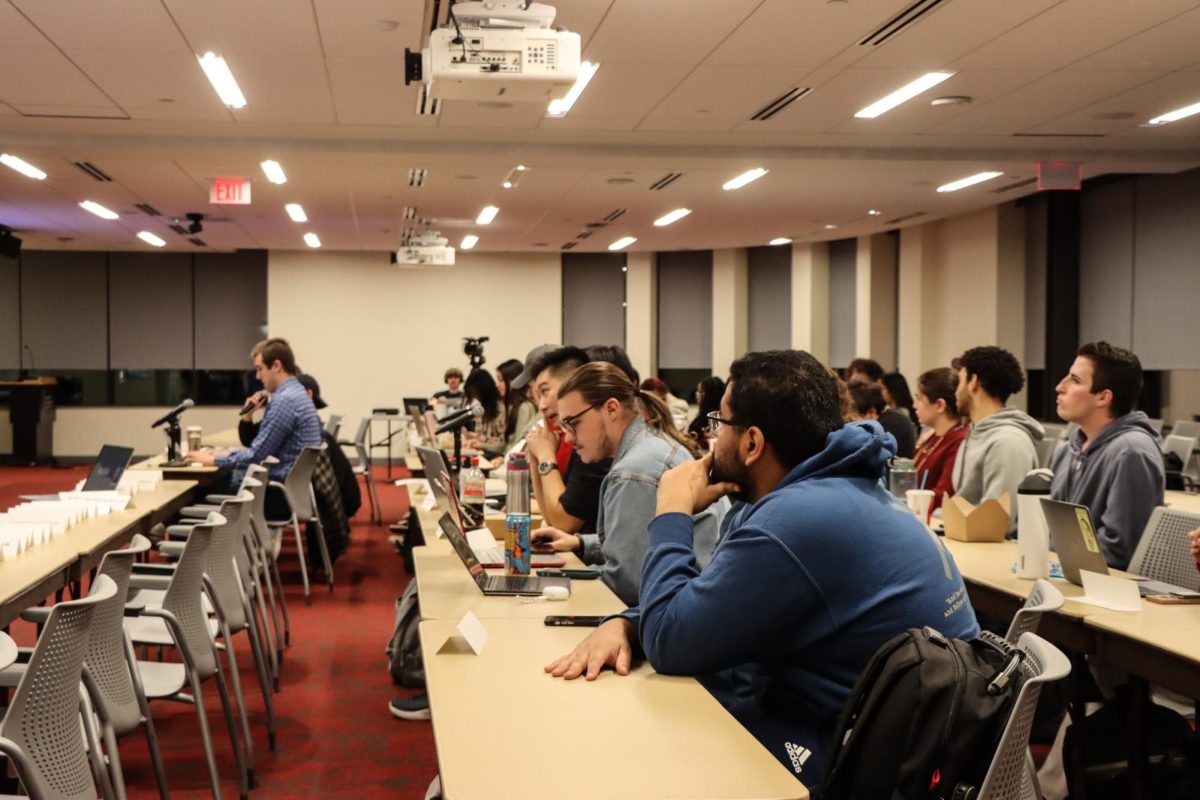
In a Wednesday, Nov. 17 meeting, the Student Government Association (SGA) appointed new members, revised a small section of the Constitution, and tabled what could have been an important voting issue.
Before the meeting, the representatives from the SGA and various Registered Student Organizations (RSOs) met to discuss the current lack of connection between the two prominent student bodies. The meeting concluded with the hope that all parties involved would try to resolve the issue of the lack communication.
Before the main motion was put on the table, three new members were sworn into the SGA. Communications and English major Jessica Stern and senior Maria Payano, a political science major, were both appointed senators for the Commuter Area. After listening to a lengthy, yet complimentary, speech by Sylvan area Governor Mitch Fleischman, economics major Zachary Dawson was appointed Chancellor of Elections.
The main issue discussed at the meeting was in regards to the Development, Relief, and Education for Alien Minors (DREAM) Act. The act is currently potential federal legislation that originated in 2001, but has come back on the radar since.
Currently, alien students, upon graduating high school, cannot enter universities or the military. The language of the DREAM Act proposes that if an alien student serves two years in the military or two years at a four-year university, the said student would then be able to obtain residency in the United States for a six-year period.
During that period, the alien student would need to complete terms of service or obtain a master’s or bachelor’s degree and remain in good standing with the law. If these conditions are then satisfied at the end of the six-year period, the student will retain permanent residency. However, if the student fails to comply with the policies, he or she will face deportation.
Current laws prevent institutions of higher education from providing in-state tuition to undocumented students.
The DREAM Act has been supported by many notable people in Massachusetts. These include University of Massachusetts (UMass) Chancellor Robert C. Holub, UMass Boston Chancellor Keith Motley, UMass President Jack Wilson, Harvard President Drew Gilpin Faust, among others.
It became clear that some senators wanted to directly table the motion because of the unfamiliarity and lack of knowledge about the act.
Senator Amanda Jusino, a sponsor of the motion, made it very clear that she would rather table the motion because of the apparent illiteracy towards the subject, but also stated that the issue is time-sensitive. The act is going before Congress on Nov. 29, and the SGA does not meet next week due to the Thanksgiving holiday. Therefore, the issue would need to be decided on before then.
The SGA motion up for debate was whether or not to call upon elected state officials to actively support the passage of the DREAM Act in a federal arena. It was emphasized that the DREAM Act does not grant any type of financial aid to these students, but rather makes them eligible to apply for loans and work study – while still barring them from applying for other financial assistance, such as Pell Grants.
It was also mentioned during the debate that, if the SGA were to support the resolution, they would be supporting students’ rights to pursue education.
The senators called upon UMass student Anna Charyk to provide an anecdote in the hope that she could offer them another perspective on the DREAM Act. Charyk’s high school boyfriend was brought by his parents to the United States from Brazil when he was eight years old. As a minor, her boyfriend had no legal right or say in where he was moving. Thus, Charyk iterated, it was not fair that he was unable to work, get a license, or join the military, since he was placed in a situation that he had no control over.
After the factual presentation about the act, the motion was immediately tabled.
Matt Medney, the chairman of the SGA’s State and Federal Organizing Committee (SFOC) explained why he felt it necessary to table the motion until the Committee’s meeting on Friday at 2:30 in the SGA office.
“I want to make sure that my committee is comfortable making the decision. As of tonight, I feel that my committee is uninformed,” said Medney. “My committee would be the one to lobby or not lobby, and I believe that they have the right before the vote to review and think more about it.”
Senator Nate Lamb supported Medney’s sentiments by saying that “it was a good thing it was tabled because we hadn’t had a chance prior to the meeting to read the motion of DREAM Act. A non-vote is always better than a non-informed vote.”
Senator Zach Broughton, on the other hand, voiced his disagreement to his fellow senators.
“The fact that the Senate voted to table the issue is a way of not voting on it,” he explained. “The issue is extremely political; in this case politics were not left at the door as they should have been.”
“We’re the students’ representatives, we’re supposed to help them,” he continued. “We did not give them the ability to talk, and we did not give ourselves the chance to support the vote. It’s too bad that it didn’t get the opportunity to be heard.”
Charcyk was disappointed in the lack of support from her peers, but affirmed that she would not stop trying to make a change.
“I’ll attend the meeting on Friday, but it may be a moot point because it will go up for federal vote most likely, before anything gets voted on,” she said. “This is an important issue because these are representatives of UMass students. My future efforts will be more geared towards a federal level in regards to called state senators.”
The SGA will not meet next week, but will resume action on Wednesday, Dec. 1.
Ashley Berger can be reached at [email protected].












